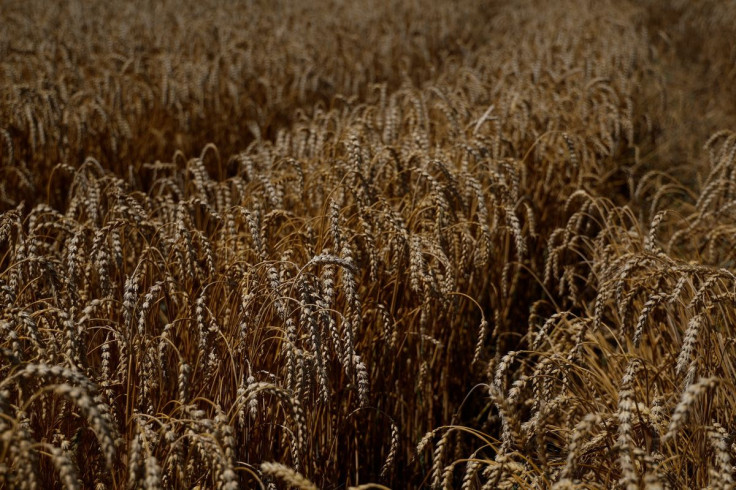Russia Says Grain Deal Stands Despite Missile Attack On Ukraine's Odesa

Russia on Monday brushed aside Western and Ukrainian alarm that a missile strike by its forces on Ukraine's port of Odesa could derail a U.N.-brokered deal aimed at easing global food shortages by resuming grain exports from the Black Sea region.
The Kremlin said Saturday's strike - denounced by Ukraine's President Volodymyr Zelenskiy as "barbarism" - had only targeted military infrastructure and would not impact the grain export arrangements in the deal reached on Friday in Istanbul.
A global wheat shortage and soaring European energy prices are some of the most far-reaching effects of Russia's invasion of Ukraine, threatening millions in poorer countries with hunger and prompting fears in Europe over heating supplies this winter.
As the war enters its sixth month, the Ukrainian military reported widespread Russian shelling in eastern Ukraine overnight. It said Moscow continued to prepare for an assault on Bakhmut in the industrial Donbas region, which Russia aims to seize on behalf of separatist proxies.
Near Kharkiv, Ukraine's second largest city located in the country's northeast, three people were trapped under the rubble of a cultural centre in the town of Chuhuyiv and a fourth person was wounded, Zelenskiy's office said.
Ukraine said on Monday its forces had used U.S-supplied HIMARS rocket systems to destroy 50 Russian ammunition depots since receiving the weapons last month. Russia did not immediately comment but its Defence Ministry said its forces had destroyed an ammunition depot for HIMARS systems.
Reuters could not independently verify the Russian or Ukrainian statements.
GRAIN EXPORTS
Friday's agreement on grain exports aims to allow safe passage in and out of Ukrainian ports, blocked by Russia's Black Sea fleet since Moscow's Feb. 24 invasion. A U.N. official called the deal a "de facto ceasefire" for the ships and facilities covered.
The Ukrainian military said two Kalibr missiles fired from Russian warships hit the area of a pumping station at the port and two others were shot down by air defence forces. They did not hit the grain storage area or cause significant damage.
Russia said its forces had hit a Ukrainian warship and a weapons store in Odesa with precision missiles.
"These strikes are connected exclusively with military infrastructure," Kremlin spokesman Dmitry Peskov said on Monday.
"They are in no way related to infrastructure that is used for the export of grain. This should not affect - and will not affect - the beginning of shipments."
Ukraine, a major world grain supplier, said earlier that preparations to resume grain shipments were ongoing.
Peskov also signalled that Russian natural gas exports to Europe - restarted last week at reduced volumes - may soon increase.
Diplomats from the European Union, which has joined the United States in imposing sanctions on Russia but has continued to buy its gas, were set to discuss targets on Monday for member states to cut their gas use. Russia has reduced supplies to Europe, blaming the sanctions.
Peskov said the installation of a turbine repaired by Canada would enable gas to be supplied to Europe in "corresponding volumes", adding that other repairs were needed to the pipeline, which was shut down for 10 days this month during maintenance.
Global wheat prices rose sharply on Monday due to uncertainty over the grain agreement, erasing most of the falls seen on Friday when traders had anticipated an easing of supply shortages.
Zelenskiy's economic adviser, Oleh Ustenko, said Ukraine could export 60 million tonnes of grain over the next nine months, but it would take up to 24 months if its ports' operations were disrupted.
REFERENDUMS
As well as the eastern Donbas region, Russia has set its sights on large swathes of southern Ukraine, where it has occupied two regions north of the Black Sea peninsula Crimea, which it annexed from Ukraine in 2014.
Russian news agency RIA said the two regions, Kherson and Zaporizhzhia, might hold referendums in early September on joining Russia, quoting Vladimir Rogov, member of the Russia-appointed Zaporizhia provincial government.
Ukraine's military reported progress in a counter-offensive in Kherson, however, saying its forces had moved within firing range of Russian targets. Kyiv has said it is steadily moving back into the region. Reuters could not independently verify the battlefield reports.
Britain said Russian commanders continue to face a dilemma - whether to bolster their defences around Kherson and nearby areas or resource their offensive in the east.
Moscow has charged 92 members of Ukrainian armed forces with crimes against humanity and proposed a new international tribunal that would handle the investigation, Alexander Bastrykin, the head of Russia's investigative committee, said in remarks published overnight.
The announcement comes after the United States and more than 40 other nations agreed on July 14 to coordinate investigations into suspected war crimes in Ukraine, mostly concerning alleged actions by Russian forces and their proxies.
Moscow denies responsibility for the food crisis, blaming the sanctions for slowing its food and fertiliser exports and Ukraine for mining the approaches to its ports.
Under Friday's deal pilots will guide ships along safe channels.
Officials from Ukraine, Russia, the United Nations and Turkey will monitor ships moving through the Black Sea to Turkey's Bosporus Strait and on to markets. All sides agreed on Friday there would be no attacks on them.
Putin calls the war a "special military operation" aimed at demilitarising Ukraine and rooting out dangerous nationalists. Kyiv and the West call this a baseless pretext for an aggressive land grab.
(Writing by Philippa FletcherEditing by Gareth Jones)
© Copyright Thomson Reuters 2024. All rights reserved.











